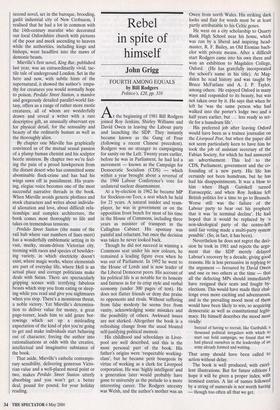Rebel in spite of himself
John Grigg
FOURTH AMONG EQUALS by Bill Rodgers Politico's, £20, pp. 310 At the beginning of 1981 Bill Rodgers joined Roy Jenkins, Shirley Williams and David Owen in leaving the Labour party and launching the SDP. They instantly became known as the Gang of Four (following a recent Chinese precedent). Rodgers was no stranger to campaigning for sanity on the Left. Twenty years earlier, before he was in Parliament, he had led a movement — known as the Campaign for Democratic Socialism (CDS) — which within a year brought about a reversal of the 1960 Labour Conference's vote for unilateral nuclear disarmament.
At a by-election in 1962 he became MP for Stockton-on-Tees, a seat which he held for 21 years. A natural insider and team- player, he was in government or on the opposition front bench for most of his time in the House of Commons, including three years as minister of transport in the Callaghan Cabinet. His apostasy was painful and reluctant, but once the decision was taken he never looked back.
Though he did not succeed in winning a Commons seat under his new colours, he remained a leading figure even when he was out of Parliament. In 1992 he went to the House of Lords and is now leader of the Liberal Democrat peers. His account of his political life is as notable for its honesty and fairness as for its crisp style and verbal economy (under 300 pages of text). He does not flatter friends or deny due praise to opponents and rivals. Without suffering from false modesty he seems free from vanity, acknowledging some mistakes and the possibility of others. Awkward issues are not shirked. Altogether the book is a refreshing change from the usual bloated self-justifying political memoir.
His childhood and schooldays in Liver- pool are well described, and this is the most personal part of the book. His father's origins were 'respectable working- class', but he became petit bourgeois by virtue of working as a clerk for Liverpool corporation. He was 'highly intelligent' and a generation later would probably have gone to university as the prelude to a more interesting career. The Rodgers ancestry was Welsh, and the author's mother was an Owen from north Wales. His striking dark looks and flair for words must be at least partly attributable to his Celtic genes.
He went on a city scholarship to Quarry Bank High School near his home, which was run by a liberal and inspiring head- master, R. F. Bailey, an Old Etonian bach- elor with private means. After a difficult start Rodgers came into his own there and won an exhibition to Magdalen College, Oxford. (He has gratefully incorporated the school's name in his title). At Mag- dalen he read history and was taught by Bruce McFarlane and A. J. P. Taylor, among others. He enjoyed Oxford in many ways and responded to its beauty, but was not taken over by it. He says that when he left he 'was the same person who had walked into the porter's lodge two and a half years earlier, but ... less ready to set- tle for a humdrum life'.
His preferred job after leaving Oxford would have been as a trainee journalist on the Liverpool Post, but when the paper did not seem particularly keen to have him he took the job of assistant secretary of the Fabian Society, for which he had answered an advertisement. This led to the CDS, Parliament, government and the co- founding of a new party. His life has certainly not been humdrum, but he has had his disappointments. It was a blow to him when Hugh Gaitskell turned Eurosceptic, and when Roy Jenkins left British politics for a time to go to Brussels. Worse still was the failure of the Labour party to bear out his prophecy that it was 'in terminal decline'. He had hoped that it would be replaced by 'a non-ideological party of the centre-left until fair voting made a multi-party system possible'. (So, in fact, it has been).
Nevertheless he does not regret the deci- sion he took in 1981 and rejects the argu- ment that the SDP merely delayed Labour's recovery by a decade, giving good reasons. He is less persuasive in replying to the argument — favoured by David Owen and one or two others at the time — that all the defecting MPs should immediately have resigned their seats and fought by- elections. This would have made their chal- lenge even more exciting and adventurous, and in the prevailing mood most of them would have been likely to win, so acquiring democratic as well as constitutional legiti- macy. He himself describes the mood most vividly:
Instead of having to recruit, like Garibaldi, a thousand political irregulars with which to start our bold campaign, we found that we had placed ourselves in the leadership of an army already formed and waiting.
That army should have been called to action without delay.
The book is well produced, with excel- lent illustrations. But for future editions I hope it will be given a proper index, with itemised entries. A list of names followed by a string of numerals is not worth having — though too often all that we get.


































































 Previous page
Previous page